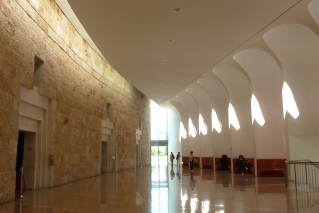 The High Court of Justice, by Emily Schneider
The High Court of Justice, by Emily SchneiderHigh Court issues order nisi demanding the government explain why the Boycott Prohibition Law should remain in effect.
Yesterday (10 December 2012) the Israel’s High Court of Justice issued an order nisi (order to show cause), ordering the state to justify the legality of the Boycott Prohibition Law. The order came following a hearing on a petition against the law filed by Adalah – The Legal Center for Arab Minority Rights in Israel and the Association for Civil Rights in Israel (ACRI) on behalf of eight civil society organizations. Lawyers and lawmakers, including the Knesset’s Legal Adviser, have harshly criticized the law, which allows entities to demand compensation in civil court from individuals or organizations who call for a boycott of Israeli settlements or Israel, without having to prove actual damages. Additionally, the law permits the Minister of Finance to impose financial penalties, including the removal of tax exceptions, on NGOs that call for a boycott. The High Court gave the State four months to file its reply and announced that it would extend its panel to include more justices in the next hearing.
Adalah Attorney Sawsan Zaher, who represented the petitioners before the court, said that Adalah was pleased by the decision. “The Justices recognized the constitutional problems with this law, which severely infringes on the constitutional rights to freedom of expression and freedom to protest.” She added that “it would have been better had the law been cancelled, though given the opposition of the legal advisors, it is not surprising that it faces harsh criticism from the court. We hope that the High Court will accept our petition and strike down this law.”
Attorneys Hassan Jabareen and Sawsan Zaher of Adalah and Attorney Dan Yakir of ACRI presented the petition in court on behalf of the petitioners: the Public Committee Against Torture in Israel; HaMoked – Center for the Defence of the Individual; Yesh Din; the Coalition of Women for Peace, a women’s rights organization that runs “Who Profits?” a project monitoring companies benefiting from the occupation; the High Follow-up Committee for Arab Citizens in Israel, which calls for a boycott of Israeli settlement products; and the Jerusalem Legal Aid and Human Rights Center, which believes that calling on the people of East Jerusalem to boycott Israel constitutes peaceful resistance to the occupation.
During the hearing, Attorney Zaher claimed that the Anti-Boycott Law “strikes at the heart of the right to expression, emptying it of content.” She added that a ruling on the case cannot be delayed as unripe (or premature) because “the mere existence of the law keeps individuals and organizations from expressing themselves freely, forcing them to change their behaviors and activities.” Justice Joubran asked the Attorney General directly during the hearing: “Most of the judicial advisors, including you, strongly criticized this law […] doesn’t that raise a red flag?”
To read the petition (in Hebrew) click here.
For a translation of the Anti-Boycott Law to English click here.







